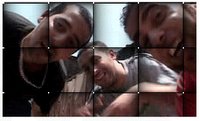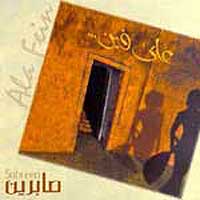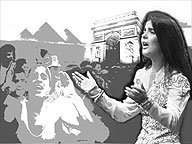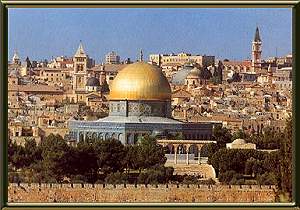
Thursday, April 27, 2006
Lyrics for "Biladi" (Motherland) and "Ana Samid" (I Remain Steadfast)

(from Palestine Lives! Songs from the struggle of the people of Palestine, Paredon Records, 1974.)
Biladi
Motherland, motherland
Fat'h is a revolution against the enemy
Palestine, the land of our forefathers
To you we will return
Fat'h is a revolution that shall win
Assifa is the hope of my motherland
Palestine, oh great love,
You are my goal and my destiny.
To you I walk, and my determination
Shall overcome oppression
Palestine, birthplace of Christ,
Destination of Muhammad's journey,
Liberate my wounded land,
Cleanse from it the usurpers.
Palestine, my only hope,
To you we shall restore
The dignity of our destitute people,
Under the banner of protracted struggle.
Palestine, your people shall not die
It shall defy silence, and Assifa
Shall keep the finger on the trigger.
Assifa walks there,
Planting the land with explosives
Loaded with destruction and doom
For every exploiter of the motherland
Samid (I Remain Steadfast)
I am steadfast, steadfast, I am steadfast
In my homeland, I am steadfast.
If they snatch away my bread, I am steadfast
If they murder my children, I am steadfast
If they blow up my house, O my house
In the shadow of your walls, I am steadfast
With pride, I am steadfast
With a stick, with a knife, I am steadfast
With the flag in my hand, I am steadfast
And if they cut off my hand and the flag
With the other hand, I am steadfast
With my field and my garden, I am steadfast
With determination in my beliefs, I am steadfast
With my nails and my teeth, I am steadfast
And if wounds in my body should multiply
With wounds and my blood, I am steadfast
Fayruz, "Sanarni'ju Yawman" (We Shall Return Someday)
Lyrics for Fayruz, "Zahrat al-Mada'in (The flower of cities)"

These are excerpts, from Joseph Massad's article, "Liberating Songs"
It is for you that I pray, O city of prayers
For you I pray, O Jerusalem
The gate of our city shall not be locked,
For I shall got to pray.
I shall knock at the gates,
And I shall open up the gates
O River Jordan, you shall wash
My face with your holy water
And you shall erase, O River Jordan
The remaining footprints of the barbarians.
For Jerusalem is ours, and the house is ours
With our own hands we shall restore the glory of Jerusalem
With our own hands, we shall bring peace to Jerusalem
Peace shall come to Jerusalem
Tuesday, April 25, 2006
Lyrics for DAM's "Who's A Terrorist?" (Min Irhabi?)

Who's a terrorist?
I'm a terrorist?!
How am I a terrorist when you've taken my land?
Who's a terrorist?
You're the terrorist!
You've taken everything I own while I'm living in my homeland
You're killing us like you've killed our ancestors
You want me to go to the law?
What for?
You're the Witness, the Lawyer, and the Judge!
If you are my Judge
I'll be sentenced to death
You want us to be the minority?
To end up the majority in the cemetery?
In your dreams!
You're a Democracy?
Actually it's more like the Nazis!
Your countless raping of the Arabs’ soul
Finally impregnated it
Gave birth to your child
His name: Suicide Bomber
And then you call him a terrorist?
You attack me and then you cry
And then you rush to complain about me [to the world]
When I remind you that you started the whole thing,
You jump to say
"You let small children throw stones!
Don’t they have parents to keep them at home?"
WHAT?!
You must have forgotten you buried our parents under the rubble of our homes
And now while my agony is so immense
You call me a terrorist?
Who's a terrorist?
I'm a terrorist?
How I am a terrorist
When you've taken my land?!
Who's a terrorist?
You're the terrorist!
You've taken everything I own
While I'm living in my homeland
Why terrorist?! Because my blood is not calm
It's boiling!
Because I hold my head for my homeland
You've killed my loved ones
Now I'm all alone
My parents driven out
But I will remain to shout out
I’m not against peace
Peace is against me
It’s going to destroy me
You don't listen to our voices
You silence us and degrade us
And who are you?!
And when did you became ruler?
Look how many you've killed
And how many orphans you've created
Our mothers are crying
Our fathers are in anguish
Our land is disappearing
And I'll tell you who you are!
You grew up spoiled
We grew up in poverty
Who grew up with freedom?
And who grew up in confinement
We fight for our freedom
But you've made that a crime
And you, the terrorist call me the terrorist!
Who's a terrorist?
I'm a terrorist?
How I am a terrorist
When you've taken my land?!
Who's a terrorist?
You're the terrorist!
You've taken everything I own
While I'm living in my homeland
So when will I stop being a terrorist?!
When you hit me and I turn the other check
How do you expect me to thank
The one who harmed me?!
I tell you what!
You tell me how you want me to be!
Down on my knees with my hands tied up
My eyes to the ground
Surrounding by bodies
Houses destroyed
Families driven out
Our children orphaned
Our freedom chained up
You oppress
You kill
We bury
We'll remain patient
We'll suppress our pain
Most importantly you feel secure
Just relax and leave us all the pain
You see our blood is like that of dogs
NOT EVEN
When dogs die they receive sympathy
So our blood is not as valuable as a dogs
No - My blood is valuable
And I will continue defending myself
Even if you call me a terrorist
Monday, April 24, 2006
Sabreen lyrics, "Here Come the Doves" (Hussein Barghouthi)

The Gypsy
I'm really a Gypsy
My job is to dance
To entertain whose who are sad
I tell fortunes for a penny-and-a-half
And I tell fortunes for the oppressed
Sitting around the hubbly-bubbly
Elbow-leaning by the fire
A boiling midnight fire
I eat only with the sweat of my brow
I'm no tyrant and no horse thief
My job is to dance
An off-beat dance
My beard is long and supports a family
And the prettiest girls are Gygpsies
I live on old things
Selling horses and antiue coins
Silver ankle-bracelets and tales
I've stood so often by prison gates
I danced and feared and said: it'll pass
I'm really a Gypsy
this is my fate
I read fortunes
In people's palms
Thirty Stars
Thirty stars twinkling over a cypress valley
Thirty stars twinkling
My heart is an open caern
If only the pretty one
Would understand
That the moon is wounded
But hope is power
Thirty stars falling over a cypress valley
Thirty stars falling
Half of a lifetime falling
And the days have changed
And dreams exchanged
And a cypress tree has broken
My heart is an open cavern
If only the pretty one
Would understand
That the moon is wounded
But hope is power
Ramallah 1989
Sometimes I walk alone
In the middle of the night
And the night is like a river
My hands in my pockets
I whistle, or smoke
In so much bitterness
The whole town is shuttered
No one around
But the void
And the army
And the wind playing
With the street lamps
Or in my hair
I stand by the fence
My chin in my hand
I stand and think, how?
All that's left of a lifetime
Is a month merely
Yet I walk, whistle or smoke
In so much bitterness
The Pirate
You are a rose
With a very thin waist
The world, rose, is made
Of strong and weak
And you are soft
Like chewing gum
And I'm an old Turkish pirate
I have a ship
Inside the harbor
The harbor is buying and selling and theft
The harbor is
Wheat and rice and water
And God has forgotten us
Inside the harbor
And I'm an old Turkish pirate
With a pipe in my hand
And a sheep-skin on my back
Carrying silver and coins
I have a ship, forgotten by God
And God has forgotten us
Inside the harbor
Come, rose, come with me
The sea is my father, keep company with me
For I'm just an old Turkish pirate
My intentions are good
And my heart is clean.
Sabreen lyrics

Kohl (Ala Fein, lyrics Talal Heidar)
This earth is swinging
Swaying this way and that
It's so very light
It can be carried by two. And tiny
doves can cross it
in two days
So I thought it yet to come...
She knocked on Time's door
to ask if two nights, long lost
Were his
He offered her two days
And told me not to say
That the nights are now kohl in the eyes
Mayyala (Ala Fein, lyrics Talal Heidar)
La, la, uncle Lala
There's a woman named Mayyala
Come from a distant village
Come to sing her mawwal
People saddened her so
To sit in her shadow she did go
I planted her, as a willow tree
And so embarrassed was she
On Man (Smoke of the Volcano, words Mahmoud Darwish)
They gagged his mouth,
Bound his hands to the rock of the dead
And said: Murderer!
They took his food, clothes and banners,
Cast him into the condemned cell
And said: Thief!
They drove him away from every port,
Took his young sweetheart,
Then said: Refugee!
O you with bloodshot eyes and bloody hands,
Night is short-lived,
The detention room lasts not for ever,
Nor yet the links of chains.
Nero died, Rome did not:
With her very eyes she fights.
And seeds from a withered ear
With wheat shall fill the valley.
Lyrics for "Nafad Al-Ahwal 2"

(from Wameedd, Kamilya Jubran & Werner Hasler. Lyrics by Paul Sha'ul)
Nafad Al-Ahwal
I stood in the middle of the room searching for my cases.
I inspected the lamp, the ashtray, loss and gain, the door and the statues. I got belittled in my own eyes so I stood in front of the mirror for long to see my face. I scrutinized the air full of smoke and coughs. I almost erased and forgot it.
I got belittled and belittled until I stood for long in front of the door to enter, then to exit, and then without a sound I stretched on the armless, open and mute bed. There I remembered what happened.
I remembered the day I was killed, raped, cut to pieces lemon by lemon, cigarette by cigarette, was ripped and for the first time I cried for my death and for nature.
Palestinian music websites

Sabreen (pictured)
Kamilya Jubran (former Sabreen lead singer)
Ramallah Underground: download samples of Palestinian hip-hop and electronica from Ramallah. Check the links for more music!
Dam (Tamer Nafar).
Monday, April 10, 2006
CD of Arab Jewish musicians

I will pass this CD out on April 11:
1. "Hineh Ma Tov," David and The High Spirit, The Jewish Sampler Vol. III
--This is an example of Shirei Eretz Yisrael (Songs of the Land of Israel): the hegemonic Ashkenazi popular music of Israel til at least the '70s
2. "Shir Shabbat," Nati Levi, 16 Oriental Israeli Soul Songs (vol. 3)
--An example of "Greek" sounding Mediterranean Israeli music
3. "Tipat Mazal (A Bit Of Luck)," Zehava Ben, Best Of Zehava Ben
--Zehava Ben's first big hit, "Turkish" style
4. "Hubi Ei," Zehava Ben, Best Of Zehava Ben
--Egyptian pop style
5. "Ma Yafou Dadaich - Mawal," Emil Zrihan, Ashkelon-Morroccan Mawal
6. "Ma Yafou Dadaich," Emil Zrihan, Ashkelon-Morroccan Mawal
--Zrihan is the cantor of the Ashkelon synagogue in Israel. This song is sung in Hebrew but the style is Moroccan Andalusian. The "mawal" is the vocal introduction, improvised; the instruments join in for the second part of the song. The melody is a popular song in the Andalusian repertoire, "Koum Tara." (Enrico Macias and Cheb Mami recorded it as a duet.)
7. "Ram Lechasdakh," Syrian Jews of Brooklyn, Let Jasmine Rain Down
--An example of the piyyutim, or religious poems, put to contemporary melodies.
8. "Yachid Ram," Syrian Jews of Brooklyn, Let Jasmine Rain Down
--Another example of piyyutim, this time performed in maqam bayati.
9. "Dana International (Airport Version)," Dana International, Danna International
10. "Samar Mar," Dana International, Danna International
--A version of a song originally recorded by Egyptian pop star Hasa al-Asmar
11. "Arusa," Dana International, Danna International
12. "Saida Sultana," Dana International, Danna International
--Whitney Houston ("My Name Is Not Susan") goes to Saudi Arabia
13. "Maganona," Dana International, Maganona
--Crazy!
14. "Paid in Full (Seven Minutes of Madness - The Coldcut Re-mix)," Eric B & Rakim, Colors (Soundtrack)
--This song, which samples Ofra Haza's "Im Nin'alu," made Ofra famous
15. "Im Nin'alu," Ofra Haza, Fifty Gates of Wisdom: Yemenite Songs
16. "Salma Ya Salama - Arabic Version," Alabina, The Album Vol II
--Eti Zach (pictured) & Los Niños de Sara. This song was a big hit for French star Dalida, who was born and raised in Egypt. The Dalida version was played when Egyptian President Anwar Sadat arrived at Ben Gurion Airport in Israel on his famous 1977 "peace" visit.
17. "Lolole (Don't Let Me Be Misunderstood)," Alabina, The Album Vol II
--"Don't Let Me Be Misunderstood" was a 1965 hit for The Animals (#3 in England, #15 in the US). Alabina sing it in Arabic and Spanish.
18. "Inqlâb Zidane 1," Enrico Macias, Hommage À Cheikh Raymond - Volume Un
--malouf from Constantine, Algeria
Friday, April 07, 2006
Guidelines for project 2

Choose between the following 3 options:
1. Questions for the readings for weeks 9-11 (Arab Jewish music): Amy Horowitz, in “Dueling Nativities,” argues that the kinds of musical practices exemplified by Zehava Ben are potentially disruptive of fixed identities and polarized claims to ownership of territory. Instead, such practices and borrowings create a sense of flexible rather than rigid identities, and as such, might contribute to the cessation, or at least the destabilization, of war.
Discuss Horowitz’s arguments, drawing on examples from at least FOUR of the articles assigned for weeks 9-11. (Only ONE of those articles should be by Horowitz.) You may also employ additional material (in addition to the 4 articles you’ve chosen), including the film, Zehava Ben: A Solitary Star, materials found on the blog for this class (mepop.blogstpot.com), and others.
Feel free to use the materials to argue against Horowitz’s claims, if you like. There is no “right” answer, what I am looking for are informed and well-argued answers. In order to make your arguments, you need to be very familiar with Horowitz’s “Dueling Nativities.”
2. Jonathan Shannon, in “Sultans of Spin,” explores how musical performance practices that are represented as “authentic” local spiritual traditions obtain their “authenticity” and “locality” through their enactment and staging in global performance contexts. One might add that they can also obtain “authenticity” and “locality” through global or Western practices of publicity and recording (and the publicity associated with the recordings: liner notes and the like).
Discuss Shannon’s arguments, drawing your examples from at least FOUR of the readings assigned for weeks 5-8. In order to do this question, you need to be quite familiar with the arguments Shannon makes. You may also draw on any additional material that you can locate.
3. If you prefer, you may choose a topic of your own (one that deals with the materials from weeks 5-11), but you MUST have it approved by me IN ADVANCE.
Papers are due, ideally, on April 13 (Thursday). If this is too early for you, please contact me. If any question is not clear, please contact me as well.
Subscribe to:
Posts (Atom)

